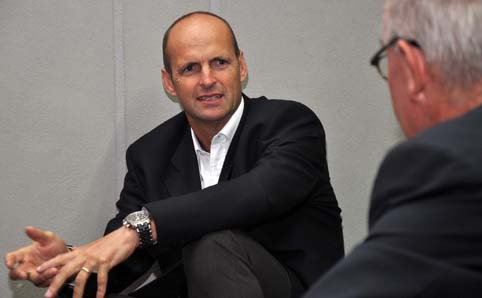Latest News Archive
Please select Category, Year, and then Month to display items
02 January 2025
|
Story Gerda-Marie van Rooyen
|
Photo Supplied
 Leading the research in South Africa is Prof Linus Franke from the Department of Soil, Crop and Climate Sciences.
Leading the research in South Africa is Prof Linus Franke from the Department of Soil, Crop and Climate Sciences.
Scientists are actively pursuing the successful breeding of diploid hybrid potatoes from inbred lines. This is expected to revolutionise potato breeding as it holds the key to rapid genetic progress. It will introduce new varieties for commercialisation through seed. Currently, existing potato variants have a gene that renders self-pollinated seeds infertile.
Prof Linus Franke, an academic in the Department of Soil, Crop and Climate Sciences at the UFS, is leading the research in South Africa. “This technology allows the production of genetically uniform potato seed that is easy to transport and largely disease-free.” He says this differs from conventional breeding whereby only vegetative propagation is possible due to tetraploid varieties in potatoes. It also risks carrying pests and diseases from one generation to the next – leading to the accumulation of pests and diseases with each round of multiplication.
Seed innovation
Prof Franke explains that Solynta BV, a seed company based in the Netherlands that produces potato varieties that can be grown from seed, has included South Africa in their research efforts because it is one of Africa’s largest producers and exporters. Through his academic relationship with Wageningen University and Research, a Dutch institution renowned for its agricultural endeavours and food production, the UFS became involved in researching hybrid potatoes grown from seed.
Diploid seeds containing two sets of chromosomes allow easier gene manipulation to increase predictability and speedier genetic progress. The breeding approach enables the incorporation of tolerance to pests, diseases, abiotic stresses (cold, heat, drought) and other desired genetic traits.
Although Prof Franke is optimistic about this research, he is not blind to disadvantages. “Potato seeds are tiny and have little energy reserves, making it harder to grow potatoes from seed than from tubers.” He says potatoes from seed will take longer to cultivate than tubers, as farmers need to grow plantlets from seeds first, adding six weeks to the growing period. “It is possible that commercial farmers can grow potatoes directly from seed. Alternatively, perhaps more likely, specialised growers will produce tubers of potatoes from seed; these tubers are then sold as seed tubers to other potato farmers, who then continue their normal practices of producing potatoes for the market from tubers.”
Financial benefits
Prof Franke says farmers have reason to get excited. “Seed potatoes will reduce input costs, as varieties with enhanced tolerance to pests and diseases require less pesticides. Planting one hectare of potatoes requires three to four tonnes of potato tubers, but only one 25 g packet of potato seeds.” Since potatoes are a more valuable commodity than maize, this technology might also increase farmers’ income potential.
Making a difference is the most important thing for Gary Kirsten
2012-05-16
 |
|
Gary Kirsten
16 May 2012
|
“Can I make a difference in someone’s life?” This was the central driving force for Gary Kirsten, head coach of the 2011 World Cup winning Indian cricket team. He currently coaches the Proteas.
Gary was the first guest speaker at a new series of lectures at our Business School. Challenges and solutions in management will be highlighted in the series. In his lecture, Gary was interviewed by Prof. Johann Coetzee, Extraordinary Professor at the Business School. The audience got a glimpse of the person often seen on television screens and they travelled with him from his childhood days at the Newlands Cricket Ground to his days in New Delhi as head coach of the Indian team.
His challenge in India was to develop a new culture in a team with very valuable and expensive brands. His light-bulb moment occurred on a team-building visit to Australia. His question to the team was what he could do for them and what they would expect from him. The turning point was Sachin Tendulkar’s answer: I would like you to be my friend. Tendulkar’s wife’s comment on the winning night was the proof of his success. She said: “The last three years were the happiest in my husband’s life.”
Gary said it was an incredible privilege to make a difference in people’s lives. “I wake up asking myself where I can make a difference in someone’s life. You must create an environment for people to enjoy the game, challenge one another and thrive.”
He is confident that the Protea team has the potential to be a great cricket team. He said the upcoming England tour is a test. “This tour will test us to be the top team in the following years. I would like to set them up for the best chance to win.”